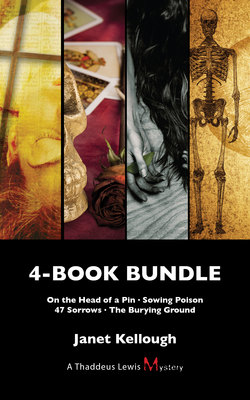Читать книгу Thaddeus Lewis Mysteries 4-Book Bundle - Janet Kellough - Страница 40
На сайте Литреса книга снята с продажи.
II
ОглавлениеThe courtroom was packed. As the bailiff cleared a path down the centre aisle for him, Lewis took note of the people who had crammed onto the rows of benches and were spilling over the ends, some of them holding small children and squalling babies, others with their market baskets tucked under their feet. Still others perched on the wide window ledges, craning for a better view, or stood on tiptoe at the back of the hall, digging their elbows into their neighbours’ ribs as they tried to get a look at the murderer. The crime had been described in graphic and substantially erroneous detail by the local newspaper, and for weeks speculation and rumour had trumpeted from its front page; the news of local sensation for once edging out the affairs of both the Province and the rest of the world.
Lewis’s name was called, and he was asked to swear on the Bible that he was speaking the truth. He was to give his testimony before Spicer gave his. This was a tactic decided on by the lawyer for the prosecution. As an ordained minister, his word was unlikely to be contested, and whatever embellishments Spicer chose to add to his own role would not in any way tarnish the truth of the matter: Simms had been caught red-handed. Quite literally red-handed, Lewis thought idly, for the dye from the book of Proverbs had been on his hands when he was wrestled down, red dye and red blood mingling together to proclaim his guilt.
When asked to describe the events of the day in question he had been encouraged to tell only of discovering Simms in the act of choking the life out of the woman in the cabin. He had described all of the murders and the reasoning that had led him to suspect Simms to the lawyer who had spoken to him beforehand. He had held nothing back, but the man had fixed him with a steely eye and said, “You have only to say that you witnessed Simms running out of the cottage and that you went inside and discovered that the woman was dead. Anything else will simply confuse the court. Do you understand?”
Lewis recounted what he had seen in a calm voice, and then the lawyer who had been appointed to defend the accused stood up. Lewis truly expected the man to question why he had been in that neighbourhood when he had no business there, why he had followed Simms, why they had burst through the door of the cottage without cause, but the man did nothing of the sort.
“How long have you been an itinerant preacher, Mr. Lewis?” he asked.
The question so took him by surprise that it took him a moment to answer. “For over twenty years,” he said finally.
“And this is with the Methodist Episcopal Church of Canada?” he asked, and barely bothered waiting for Lewis’s nodded reply before returning to his seat.
“No further questions, Your Honour.” And with that he was dismissed.
The lawyer had given it all up as a bad cause, he realized. He was simply going through the motions, not interested in the whys and the wherefores, just in getting the whole thing over with so that he could go home to his dinner. There was no doubt what the outcome would be: Simms would hang.
He didn’t bother waiting for Spicer. Word would spread soon enough about his testimony, and what the court had decided. Instead, he walked down by the river to watch the water trickling over the rocks. The rains had finally stopped — there had been none for nearly a month now — and the river was low again. One could almost have walked across it, unlike during the spring when the sheer weight of the water threatened to sweep away the bridge where the river emptied into the bay.
There were men working on this bridge as he watched, heaping up great boulders and rocks around the pilings, strengthening the banks that channeled the stream toward the outlet that led to the open water beyond. Every year they piled their rock and fortified their beams and some years it was enough; but a spring of heavy rain or a sudden torrential outburst could swell the river all along its course, from the far backcountry to the bay, and then the water would spill over its banks, flooding the streets and the cellars and leaving behind a greasy, gritty film that stank and festered.
Every year there was someone drowned in the river’s torrent, most often a young boy, for the boys seemed unable to keep away from it. There were enough dangers for them in the course of life, you would think they would know enough not to court the ones they could avoid. There was the cholera that swept through Canada in devouring epidemics, malaria that came from the swampy areas being cleared, unexplained fevers and quinsies and convulsions, sharp axes that could remove a limb in a twinkling, horses that could throw, bulls that could gore; you would think it would be enough without adding drowning to it all. Or war. Or murder. Life was fragile, vulnerable in this place, and no effort seemed able to hold it in place, no words could stop it from slipping away, no prayers seemed able to protect it.
